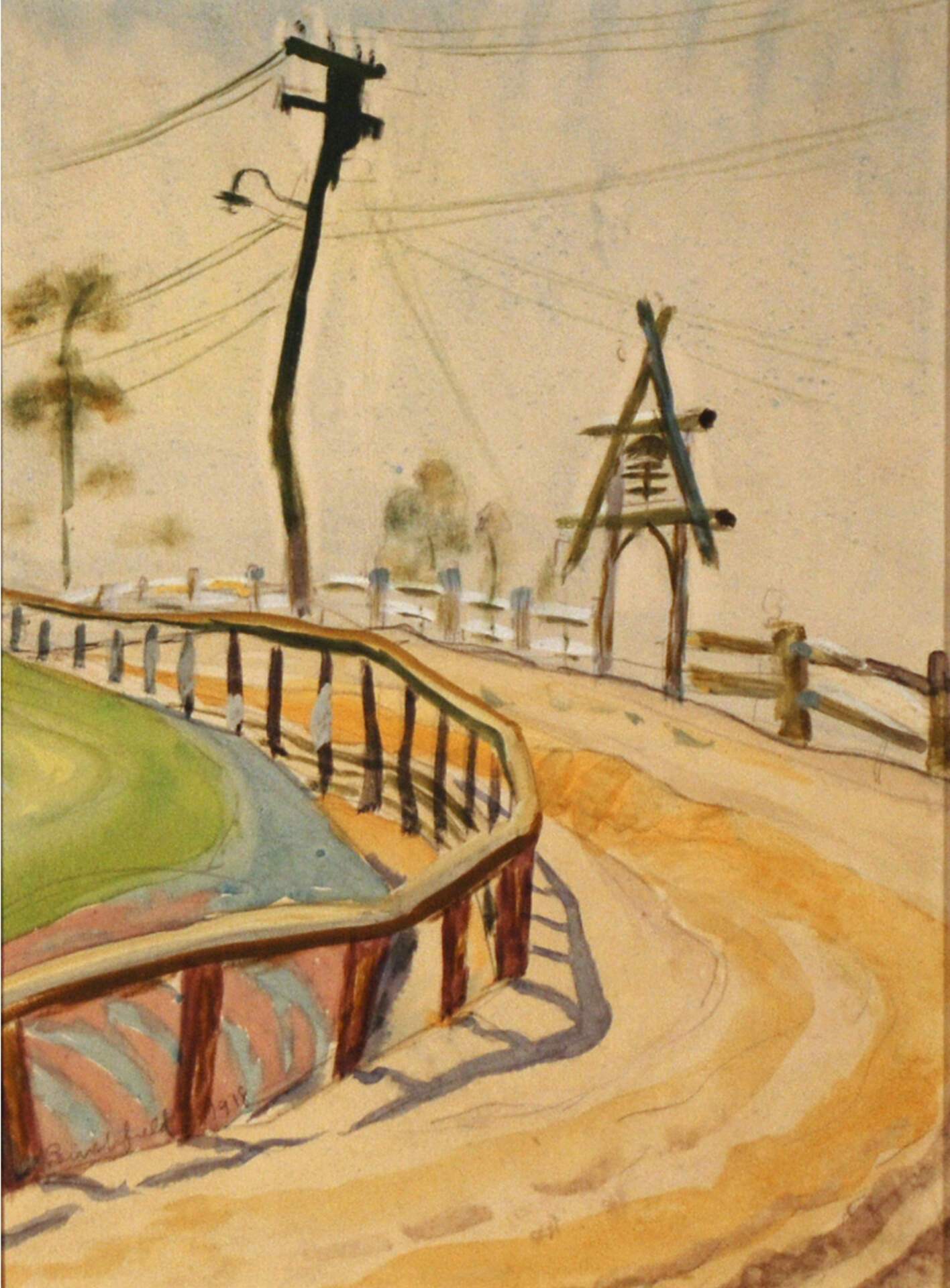
Charles E. Burchfield (1893-1967), Camp Road, Jackson, South Carolina, 1918; watercolor and graphite on paper, 11 3/4 x 8 5/8 inches; Burchfield Penney Art Center, Gift of Charles Rand Penney, 1994
Charles E. Burchfield, Journals, February 17, 1940
Wednesday, Feb 17, 2016
About noon “an old friend of twenty years standing” – called up, who proved to be “sergeant” Pearson, one of the camouflage boys at Camp Jackson. We made arrangements for him to come out on a Clinton bus where I should meet him. (at 1:30).
Before he came, I thought it was ridiculous for us to meet again, for we had not been fond of each other then – his was the second trunk from mine. What I remembered of him was that he was slow, plodding, and humor-less; impervious to the sights and insults Eskridge & I rudely offered him (E’s bunk was next to mine –) There was a vague feeling too that there was something else about him I did not like, but it eluded me.
But after all, when he came, I enjoyed the visit we had. And I was struck with how little he had changed in manner or appearances. When I drove up to the bus he was waiting – his whole posture, the way he wore his hate etc was so like his soldier appearance.
He told me an episode of his making a cast of a dead mule which completed and enhanced what I already knew of it, which had to do with an officer (major) riding up on his horse over an artificial hill, and going thru, much to his disgust and rage. This I had joyously beheld myself as I sat under a tree making camouflagé designs.
It was Capt. Yanow (the Camouflage Commander) idea to model a dead horse, which being follow would be used for a periscope cut out over a dugout, an ingenious idea. Pearson, was given the job, as he was a budding sculptor. He thought it would be simpler and more realistic to make a cast from a dead horse itself. Dead horses were not easily procured, and so after a two weeks wait, they had to content themselves with a dead mule secured from a nearby farm. The mule was already two days on the way toward disintegration, nevertheless, Pearson and his helpers, who had requisitioned a truck for the errand, sat on the mule as they went thru the camp, and sang ribald songs, at the top of their voices, much to the amazement of lookers on –
Pearson’s work proceeded slowly, and the scratch-out the odor of the mule grew more frightful with each passing hour (Eskridge & I were sure that Pearson bought it to the barracks with him, and treated him accordingly) – One afternoon, Pearson said – he and his helper Peck, were busily working, when all at once, as one will often do, he realized that for some time someone had been calling him, but it had not completely penetrated his consciousness. – Turning he beheld this major (his name eluded me, but he was some rich man’s spoiled brat) at some distance, on his horse, gesticulating wildly with one hand, and holding his nose with the other – Pearson hurried over and saluted –
“What the ------ ----- ------ have you got over there” the major roared –
“A dead mule, sir” was Pearson reply (sic), with as much sang froid as he could muster –
“A dead mule – You know it’s against the regulations to allow a dead animal to lie in the camp – who gave you permission to bring it here?”
“Capt. Yanow sir?”
“Where the hell is he?”
“I presume over in the woods there, sir (some of the camouflage work took place in a pine grove near at hand) –
“Well, I’ll show him whether he can bring dead mules in to the camp” – and putting spurs to this horse, he rode furiously off, only, a few minutes later, to plunge thru the artificial hill, which had been so skillfully constructed that few would know it was not real, unless they had been told. It threw him from his horse, and by the time, with the aid of whatever soldiers were around, he had extricated himself, he was speechless with rage. When (sic) ensued between him & Yanow, we never knew, but the mule was forthwith destroyed at the Camp incinerary (sic), and when later a dead horse was procured, the work had to be done at this place.
Pearson was on his way to New York, and had been stopped in Brockton because he had no plates on his car (He had paid for them in Illinois, but for some reason had not been able to get them, and had been told his receipt was sufficient). He seems to be at loose ends – he long ago married a German girl, who after two years of America, went home on a visit and never returned.
Charles E. Burchfield, February 17, 1940